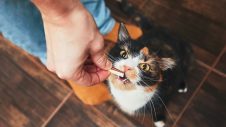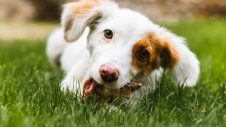The chocolate treats we enjoy are poisonous if shared with our furry friends. The danger with chocolate is that animals, such as dogs, cats, parrots and horses, can’t effectively metabolise the chocolate chemical known as alkaloid theobromine.
This chemical can remain in an animal’s bloodstream for many hours, leading to hyperactivity and excessive urination. It can even be fatal if not detected and treated.
Dr Justin Silcock of Greencross Vets’ Forest Lake Village clinic in Brisbane recently experienced first-hand the dangerous mix of dogs and chocolate eggs.
“A woman discovered her dog eating a packet of chocolate-coated almond Easter eggs – and what made it worse was that it was dark chocolate, which contains far more chocolate solids than milk chocolate,” Dr Silcock said.
“Luckily, the dog’s owner brought it down to our clinic straight away to be checked.”
“While the dog was fairly bright, we decided to administer apomorphine to it, which induces vomiting.”
“It wasn’t long before the dog was vomiting up several pools of chocolate.”
As unpleasant and uncomfortable as this vomiting was for the dog, Dr Silcock said that if it hadn’t vomited up the chocolate, the end result could have been a lot worse.
“It’s important owners are educated about the dangers of dogs eating chocolate, especially at Easter when there is more chocolate around the house,” he said.
“It only takes one gram of dark or baking chocolate per kilogram of your dog’s weight for the chocolate to reach toxic levels.”
With pets now such important family members, it is only natural that they may often be fed the same things we eat. However, some foods that are completely harmless to humans can cause severe problems in our pets. Pet owners should be particularly vigilant to ensure their special friends don’t eat chocolate or that children don’t offer this potentially dangerous food to them.
Some symptoms of poisoning might not become evident for several hours, so it is important to seek immediate treatment for any animal you suspect has ingested chocolate.
One small Easter egg is unlikely to cause problems for a healthy dog, but giving any amount of chocolate to our pets is not worth the risk.
Here are some other key food groups to keep away from your pets:
- Hot foods. Freshly cooked meats can reach very high temperatures, which can burn the mouth or throat of a pet that has enthusiastically gobbled something up. Please seek immediate veterinary care, as burns are painful and can lead to internal scarring and narrowing of the oesophagus.
- Corn on the cob. Enthusiastic eaters have been known to swallow corn cobs whole! They can easily get lodged in your pet’s intestine if swallowed.
- Kebab sticks. These can cause intestinal perforation (a hole in the intestine).
- Desserts. Summer desserts and sweet treats may contain macadamias or chocolate, which are highly toxic to dogs. Rich dairy products may also cause stomach upsets in sensitive pets.
- Ribs or bones. Many people believe feeding dogs bones is safe or even healthy; however, it is hazardous. Bones can cause broken teeth, choking or internal damage. Cooked bones are particularly dangerous and must be avoided.
- Alcohol. A beer or Aperol Spritz are popular thirst quenchers during the balmy months; however, dogs cannot process alcohol well, leading to liver failure, which can be fatal. Put your bottle bin in a spot that ensures pets cannot lick up any spilled alcoholic beverages.
- Onions. All members of the onion family (garlic, scallions and shallots included) contain compounds that cause anaemia in pets, causing weakness. While the amount required to make your dog sick is significant, it’s best not to take the risk.
- Salty foods. Salted chips and crisps are high in sodium, and these can leave your pet very thirsty, which can turn quickly into dehydration on a hot day. Ensure your pet avoids salty foods and always has access to fresh, clean water.
- Raisins and grapes. These fruits can cause kidney and liver problems.
- Avocados. This salad favourite can cause problems in some dog breeds.
If your pet eats something they shouldn’t have, our partner emergency vet hospitals are always open 24/7, including all public holidays. If you are not sure if your pet needs to see a vet, you can also contact WebVet for peace of mind. With WebVet, you can speak with a vet anytime, anywhere via video call, and it’s free for Healthy Pets Plus Members. Learn more.

 Greencross Vets
Greencross Vets 








